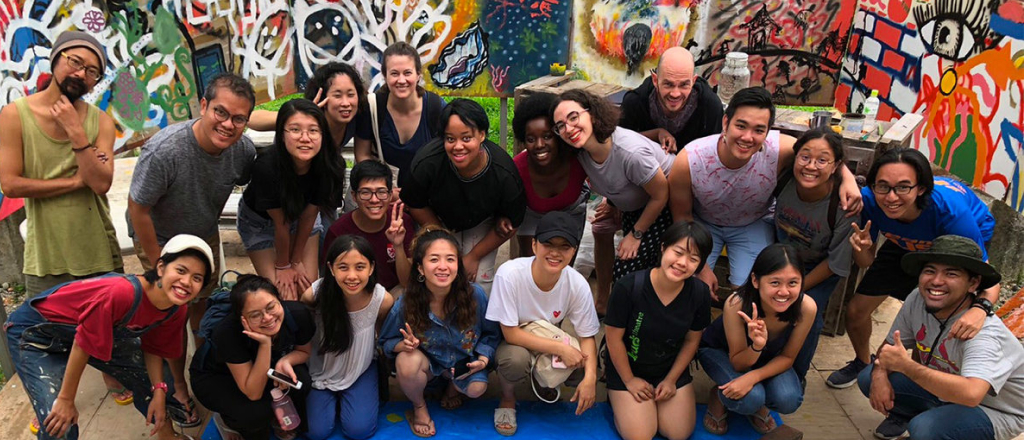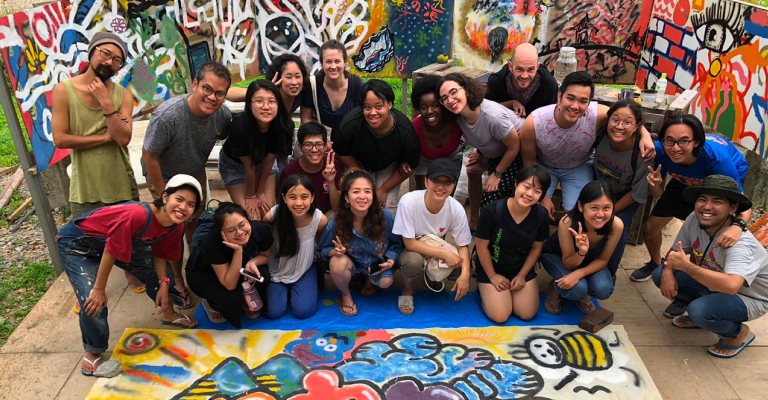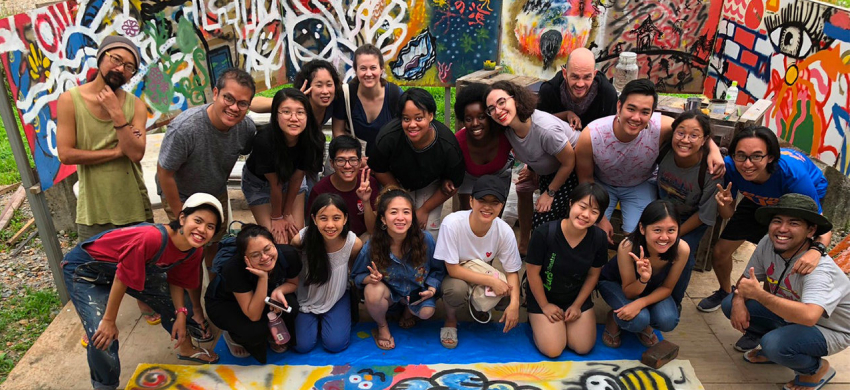This page contains a catalogue of the courses that have been offered under the Arts and Humanities major/minor in recent years. It also provides a short description of the core courses that all Arts and Humanities majors are required to take as part of their degree requirements.
Core Courses
Introduction to the Arts Course
All students majoring or minoring in Arts and Humanities need to take this course as early as possible during their studies at Yale-NUS College. This course is intended as an introduction to various forms and modes of artistic practice, history, and theory. Each iteration will focus on a different broad theme that will inform the various lectures, seminars, studio exercises, and assignments over the semester. The course allows students to experience and recognise the practices and traditions of the representative tracks, and form connections between them. Students will learn how to apply their knowledge of several of these forms of their choosing, in a final portfolio that demonstrates their capabilities in at least in one theoretical mode and two practical modes and includes reflection on and self-assessment of their processes.
This course will allow for the development of skills that will enable a student to:
- Identify elements, forms and structures in different art forms;
- Describe and communicate diverse artistic practices;
- Analyse artworks with reference to the specific medium and its conventions;
- Reflect on the development of artistic processes and practices through time;
- Demonstrate the skills and techniques needed for the practice of an art form; and
- Conduct critical analysis of one’s own and other student’s work.
Sample Electives in Art History
YHU2267 Modern Art in East Asia
This course will examine the drastic transformation and development in Modern East Asia during the late 18th to early 20th centuries. Through close study of visual culture and art production from Japan, China, and Korea, it covers broader themes of modernity, transitions from a pre-modern to modern society, the construction of a national identity vis-a-vis the Western world, and the establishment of official art schools and exhibition practice. With the broader social context of Westernisation and modernisation, we will examine the many artistic movements and subjects of visual representation that flourished during these tumultuous times. This course fulfils the Art History track in the Arts and Humanities major.
YHU2203 -Masterpieces of Western Art: Renaissance to the Present
This course will examine a series of artistic masterpieces from the Western tradition, ranging from the Byzantine icon to contemporary installation art. Instead of a Renaissance-to-Modern survey, we will delve deeply into each of the selected artworks, simultaneously examining their extraordinary uniqueness and their capacity to represent an entire cultural epoch, both aesthetically and conceptually. Along the way we will ask what makes these works “masterpieces” and debate how and why they came to form the Western artistic “canon.” We will also address the changing notions of what art is and what functions it fulfills. Close looking and visual analysis will be supplemented with a number of primary and secondary readings, seminar discussions, student presentations and museum visits.
YHU3274 Painting the Orient: Orientalist Representations in Nineteenth-Century European Visual Culture
This course will examine the politics and poetics of Orientalist representations in nineteenth-century European visual culture. Beginning with the colonial encounter, fascination with the so-called “Orient” found expression in a variety of different media, including painting, architecture, design, photography, theatre and film. Taking Edward Said’s seminal definition of Orientalism as a point of departure, the course will focus on a particular historical moment in the first half of the nineteenth century when Orientalist painting first rose to prominence as a popular genre of visual representation. We will then proceed to examine a series of case studies by celebrated European artists such as Delacroix, Ingres, Gros and Girodet amongst others, alongside key primary and secondary literature. Students will also engage with different theoretical positions and methodologies, including Marxist, feminist and subaltern critiques, exploring how the legacy of Orientalism continues to influence our perceptions of the East/West binary to this day.
YHU4207 Critical Approaches to Art History
This course is designed as an introduction to the analysis of art as a historical and critical discipline. It is at once historiographical, methodological and theoretical and examines the different approaches that scholars and critics have adopted over the centuries to understand and interpret various artworks. Through a wide range of both classical and current texts, students will acquire the fundamental tools with which to approach the visual arts. The course is specifically aimed at students, who are planning to pursue an art historical topic as part of their senior capstone project in the Arts and Humanities major.
Sample Electives in Art Practice
YHU3342 Integrative Music Theory 2
This course furnishes students who are already familiar with music fundamentals with the opportunity to learn and develop intermediate knowledge and skills, with a focus on practical transference into their lives as music performers and listeners. Notated and improvisational assignments will be given as exercises to further students’ familiarity with musical concepts and materials. It is designed to continue on from Integrative Music Theory 1, but students who have not taken this course may still be allowed to enrol in Integrative Music Theory 2 with the instructor’s permission, provided that they can demonstrate the necessary musical competency and knowledge. To cater to diverse student interests and backgrounds, application of theoretical concepts will be addressed as they occur in Western art music, experimental music, pop, jazz, and Carnatic music.
YHU3344 Theatre-Making Laboratory
This is a practice-based course wherein students collaboratively develop and perform original short theatre works. A range of theatrical forms and creative processes are explored including plays, site-specific, devising, and ritual. The course also introduces several modern and classical understandings of theatre-making from international traditions. Developing and performing theatre hones universally applicable skills such as creative thinking, public speaking, and critical analysis. Students take healthy risks that foster artistic and personal growth. Rehearsal is required outside class time. No previous experience in theatre is required.
YHU4243 Art Studio Research, Experimentation and Critique
This course fulfils the advance practice requirement (Art Practice track) of the Arts and Humanities major. It aims to bridge 3000 level art studio courses and the Arts Practice capstone, and investigates topics and practices in the contemporary arts. Students will develop a deeper understanding of its changing contexts, and create a portfolio of in-depth research processes and methods related to their topics of interest during studio hours and weekly critiques. There will be readings on the philosophy and history of art and aesthetics, and artist studio visits. Students will have to plan, exhibit, present, and discuss their works.
Sample Electives in Creative Writing
YHU2310 A Reporters Toolbox: The Practice of Daily Journalism
This course covers the fundamentals of daily journalism, including news analysis, story ideation, source establishment, interviewing subjects, ethical decision making, and writing with clarity, accuracy, and creativity on a deadline. Students will examine news and writing in leading international dailies, study the decisions that editors and reporters make, and produce journalistic work of their own. The course will include instruction on the legal and ethical issues concerning interviewing subjects.
YHU2292 Introduction to Writing Poetry
As its title implies, this course will introduce students to the art of writing poetry. There will be readings assigned, but this will mainly be a writing course, with weekly writing assignments and peer critiques.




